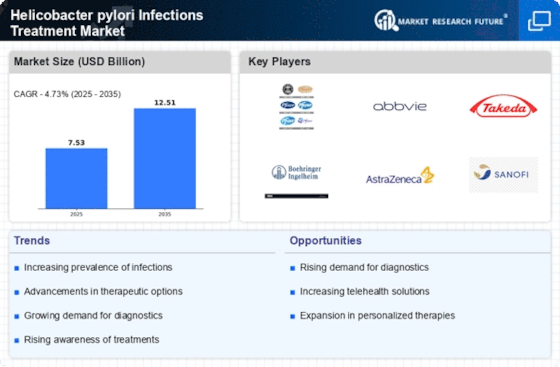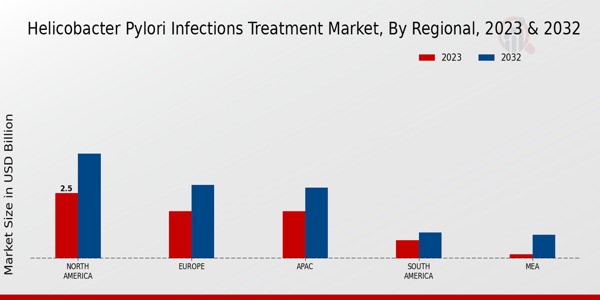Market Growth Projections
The Global Helicobacter pylori Infections Treatment Market Industry is projected to experience substantial growth over the coming years. With a market value of 7.52 USD Billion in 2024, it is anticipated to reach 12.5 USD Billion by 2035. This growth trajectory reflects a compound annual growth rate of 4.74% from 2025 to 2035. Factors such as increasing prevalence of infections, advancements in treatment modalities, and rising awareness are driving this expansion. The market's evolution is indicative of a broader trend towards improved healthcare outcomes and the development of effective treatment strategies for Helicobacter pylori infections.
Rising Incidence of Gastric Cancer
The correlation between Helicobacter pylori infections and gastric cancer is increasingly recognized, driving the Global Helicobacter pylori Infections Treatment Market Industry. Research indicates that H. pylori is a significant risk factor for the development of gastric cancer, prompting healthcare systems to prioritize effective treatment strategies. As the global burden of gastric cancer rises, there is a growing emphasis on eradicating H. pylori to mitigate this risk. Consequently, this trend is expected to bolster the market, as healthcare providers seek to implement preventive measures. The focus on reducing gastric cancer incidence through H. pylori treatment is likely to shape future market dynamics.
Advancements in Treatment Modalities
Innovations in treatment modalities are significantly influencing the Global Helicobacter pylori Infections Treatment Market Industry. Recent developments in antibiotic therapies, including the introduction of novel agents and combination therapies, have shown promising results in eradicating H. pylori. For instance, the use of bismuth quadruple therapy has gained traction due to its enhanced efficacy. These advancements not only improve patient outcomes but also contribute to the market's expansion. As the industry evolves, the introduction of new treatment regimens is anticipated to drive the market towards a projected value of 12.5 USD Billion by 2035, indicating a robust growth trajectory.
Regulatory Support for Treatment Approvals
Regulatory bodies are increasingly supportive of the development and approval of new treatments for Helicobacter pylori infections, which is a significant driver for the Global Helicobacter pylori Infections Treatment Market Industry. Streamlined approval processes and incentives for research and development are encouraging pharmaceutical companies to invest in innovative therapies. This regulatory environment fosters competition and accelerates the introduction of effective treatment options. As a result, the market is poised for growth, with new therapies entering the market and expanding treatment choices for patients. This supportive landscape is expected to enhance market dynamics and contribute to overall industry expansion.
Growing Awareness and Screening Initiatives
The increasing awareness surrounding Helicobacter pylori infections and the importance of early detection is a crucial driver for the Global Helicobacter pylori Infections Treatment Market Industry. Public health campaigns and educational initiatives have led to heightened awareness among healthcare professionals and patients alike. Screening programs are being implemented in various regions, facilitating early diagnosis and timely treatment. This proactive approach is likely to enhance treatment uptake, thereby contributing to market growth. As more individuals seek diagnosis and treatment, the market is expected to witness a compound annual growth rate of 4.74% from 2025 to 2035, reflecting the positive impact of these initiatives.
Increasing Prevalence of Helicobacter pylori Infections
The rising incidence of Helicobacter pylori infections globally is a primary driver for the Global Helicobacter pylori Infections Treatment Market Industry. It is estimated that nearly half of the world's population is infected with this bacterium, leading to conditions such as gastritis and peptic ulcers. This high prevalence necessitates effective treatment options, thereby propelling market growth. In 2024, the market is projected to reach 7.52 USD Billion, reflecting the urgent need for innovative therapies and diagnostic tools. As awareness of the health implications of these infections increases, the demand for treatment options is expected to surge, further stimulating market dynamics.






















